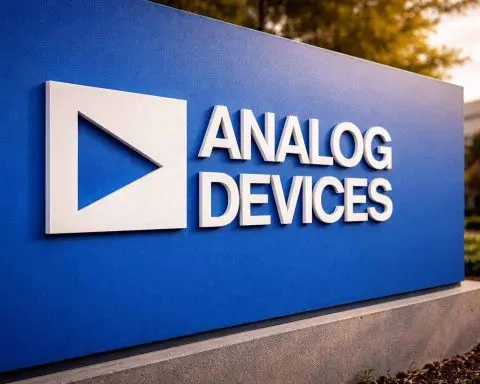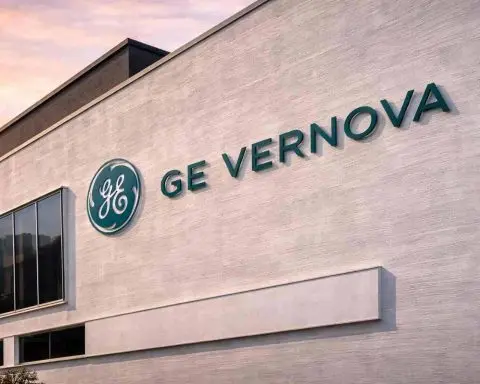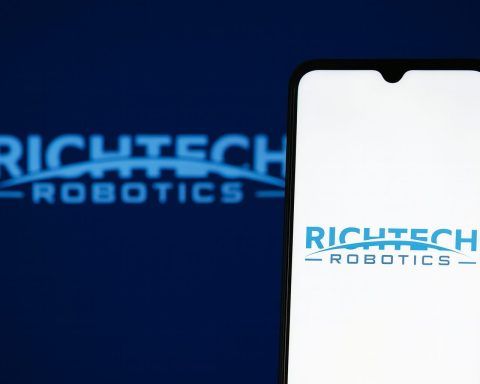- SoundHound AI posted Q2 revenue of $42.7 million, up 217% year-over-year, about $10 million above expectations, and lifted full-year revenue guidance to $160–$178 million.
- Palantir Technologies reported Q2 revenue above $1 billion for the first time, with U.S. government sales up 53% to $426 million (over 42% of total revenue), and raised full-year revenue guidance to $4.14–$4.15 billion, with the stock up about 4%.
- C3.ai pre-announced weak Q1 results, with CEO Thomas Siebel calling sales “completely unacceptable,” sending the stock down over 14% after hours as the company began a leadership search and D.A. Davidson cut the target to $13.
- Tesla’s Elon Musk said the company will streamline AI chip development and focus on the next-generation “Tesla AI5” and “AI6” chips for real-time inference, while the Dojo team was disbanded and its R&D folded into the main program.
- SoftBank Group posted a quarterly profit of ¥422 billion (~$2.9 billion) for April–June, announced a $30 billion OpenAI commitment and leadership on the $500 billion Stargate AI data-center project, and saw its stock jump over 13% in Tokyo as the Topix topped 3,000.
- Rumble publicly floated a bid of about €1.17 billion ($1.2 billion) to acquire Northern Data’s AI cloud assets, including roughly 20,480 Nvidia H100 chips and more than 2,000 H200 chips, with the board evaluating the offer and Tether signaling support.
- The U.S. government secured a 15% revenue levy on Nvidia and AMD from China-related AI chip exports to the Treasury as a condition for licenses to bypass export restrictions, triggering pre-market dips of about 1.8% for Nvidia and 3.3% for AMD.
- Chinese state media linked to CCTV denounced Nvidia’s H20 chips as unsafe and potentially backdoored, while China’s cyber watchdog summoned Nvidia to demand proof there are no hidden access channels.
- SK Hynix projected AI memory demand growth at roughly 30% annually through 2030, driven by high-bandwidth memory (HBM) used in accelerators like Nvidia GPUs, with cloud providers’ AI capex expected to stay strong despite higher memory prices.
- Bank of America’s fund-manager survey showed about 45% of managers naming the Magnificent 7 as the top AI-driven trade, while Palantir price targets were raised to $170 (Baird) and to about $175–$180 (HSBC/Daiwa), highlighting ongoing valuation debates in the AI rally.
It’s been a whirlwind 48 hours for AI-focused stocks, marked by blockbuster earnings beats, billion-dollar deals, and new twists in the global AI arms race. Major AI companies and tech giants are seeing surging share prices on bullish results – even as a few stumble on missed targets. Meanwhile, big-ticket acquisitions and investments underscore how hot the sector has become. From C3.ai’s struggles to SoftBank’s record run, and from Nvidia’s export drama to a $1.2 billion cloud takeover bid, here’s your comprehensive roundup of the latest AI stock market developments.
Earnings Winners: AI Stocks Soar on Blistering Growth
Several pure-play AI companies delivered standout results that sent their stocks flying. SoundHound AI – a voice AI software maker – rocketed nearly 25% higher after posting its “strongest ever quarter.” The company’s Q2 revenue shot up 217% year-on-year to $42.7 million (about $10 million above expectations) as all business segments grew, helping to dramatically narrow losses investopedia.com investopedia.com. SoundHound also raised its full-year revenue forecast slightly (now $160–$178 million, vs. $157–$177 million prior), gaining new automotive deals in China and other wins across the board investopedia.com investopedia.com. “This was our strongest ever quarter,” CEO Keyvan Mohajer declared, as investors piled in on the upbeat news investopedia.com.
Another winner was Palantir Technologies, which continues to ride the AI wave. While Palantir’s blockbuster earnings came a few days earlier, the data analytics firm’s momentum is still reverberating. Palantir’s Q2 revenue topped $1 billion for the first time – about 48% growth – buoyed by soaring demand for its AI platforms from both commercial clients and governments reuters.com. Notably, sales to the U.S. government jumped 53% to $426 million (over 42% of total revenue) amid rising defense and security spending reuters.com. The company beat profit estimates and hiked its full-year outlook for the second time this year, now projecting $4.14–$4.15 billion in revenue – well above prior guidance and consensus reuters.com reuters.com. Palantir’s stock, which has more than doubled in 2025 on AI optimism, jumped another ~4% after earnings reuters.com. “They have accelerants on both sides (commercial and government),” noted D.A. Davidson analyst Gil Luria, who highlighted strong U.S. defense orders and private-sector interest driving Palantir’s growth reuters.com reuters.com.
Setbacks: An AI Laggard Stumbles Amid Downgrades
Not all AI-centric firms are sharing in the spoils. C3.ai, an enterprise AI software provider, shocked investors with a pre-announcement of weak results that badly missed its own targets. In a late Friday update, C3.ai’s CEO Thomas Siebel admitted Q1 sales were “completely unacceptable,” blaming a disruptive salesforce restructuring and his recent health issues for the shortfall businesswire.com businesswire.com. The company also launched a search for a new CEO as Siebel – who suffers from a serious vision-impairing autoimmune disease – signaled plans to step back businesswire.com investing.com. Following the news, C3.ai’s stock plunged over 14% in after-hours trading and continued to slide as markets opened 247wallst.com.
Wall Street was swift to react. D.A. Davidson downgraded C3.ai to “Underperform” and slashed its price target nearly in half – from $25 down to $13 – citing the company’s “significantly below guidance” sales and flagging confidence in its growth story investing.com. The analyst warned that it’s likely “the business gets worse before it gets better from here,” given C3’s reliance on large one-off deals and execution missteps investing.com. In an attempt to change the narrative, C3.ai pointed to new partnerships (with shipbuilder Huntington Ingalls and petrochemical firm Univation) and brought in a seasoned Oracle executive to lead sales investing.com. But for now, investors remain unconvinced, and C3.ai has become an AI stock cautionary tale amid an otherwise red-hot sector.
Tech Titans Double-Down on AI Initiatives
The world’s biggest tech companies – many at the forefront of AI – are doubling down on their AI ambitions, driving broader market gains. A Bank of America fund manager survey released Monday shows that being “long the Magnificent 7” (the top U.S. tech giants) is once again seen as the world’s most crowded trade reuters.com. About 45% of fund managers named these AI-driven Big Tech stocks – from Nvidia and Microsoft to Alphabet, Amazon, Apple, Meta, etc. – as the top consensus bet, reflecting resurgent investor confidence. Strong recent earnings have indeed helped big tech shares rebound sharply from a spring dip, as sentiment toward the global economy improves reuters.com reuters.com.
One tech titan making headlines is Tesla, where CEO Elon Musk is refocusing the EV maker’s AI efforts. According to Musk, Tesla will “streamline” its AI chip development and concentrate on its next-generation “Tesla AI5” and “AI6” chips – optimized for running AI models in real time reuters.com. This move comes amid reports (via Bloomberg) that Musk disbanded Tesla’s “Dojo” supercomputer team, which had been designing custom training chips for Tesla’s self-driving tech reuters.com reuters.com. “It doesn’t make sense for Tesla to divide its resources… All effort is focused” on the unified chip roadmap for both AI inference and training, Musk explained on X (Twitter) reuters.com. Notably, Morgan Stanley analysts last year valued Tesla’s Dojo project at $500 billion in potential, seeing it as a cloud-like business beyond cars reuters.com. Musk’s decision to fold Dojo’s R&D into the main chip program signals a strategic pivot – aiming to deliver advanced AI capabilities in Tesla vehicles without overstretching on experimental hardware.
Apple, for its part, has been characteristically quiet on splashy AI moves – eschewing the headline-grabbing AI acquisitions or foundation model reveals of its peers. Some analysts see Apple’s relative silence as strategic patience, while others warn it could signify behind-the-curve thinking. (The company’s focus has been on integrating AI features more subtly into products like Siri and the upcoming Vision Pro headset, rather than hyping standalone AI platforms.) Still, given Apple’s massive resources, few doubt it will play a significant role in AI – even if it’s playing the long game.
Big Deals and Investments Heat Up the AI Sector
Mergers, acquisitions, and giant investments are further evidence of how hot the AI space has become globally. Over the weekend, video platform Rumble – known for its YouTube alternative and cloud services – revealed it’s considering a bold $1.17 billion bid to acquire Germany’s Northern Data, a specialist in AI cloud infrastructure reuters.com. The proposed deal (about €1 billion) would give Rumble control of Northern Data’s GPU-rich cloud division (“Taiga”) and its data center business reuters.com. Why is Rumble interested? Northern Data comes with a massive stockpile of AI hardware – including roughly 20,480 Nvidia H100 chips and over 2,000 H200 chips in its servers reuters.com. Those are among the world’s most advanced AI processors, critical for training and running AI models. Integrating that capacity would instantly turbocharge Rumble’s cloud capabilities. Northern Data said on Monday its board is evaluating the potential offer and open to discussions, though any formal bid may ultimately come at a higher valuation reuters.com. (Notably, Northern Data’s largest shareholder – crypto firm Tether – has signaled support, even planning a multi-year commitment to buy GPUs from Rumble if the deal goes through.) While no certainty exists that a definitive agreement will be reached reuters.com, the talks underscore the growing trend of cross-border tie-ups to secure AI computing power.
Another splashy move comes from Japan’s tech conglomerate SoftBank Group, which just saw its stock surge to record highs on the back of big AI bets. SoftBank shares jumped over 13% in Tokyo on Friday after the company swung to a surprise quarterly profit, confirming founder Masayoshi Son’s strategic pivot back into AI reuters.com reuters.com. In the April–June period, SoftBank earned ¥422 billion (~$2.9 billion) – a sharp turnaround from a loss a year earlier reuters.com. The results were fueled by soaring valuations in SoftBank’s AI-heavy investment portfolio, which includes both publicly traded and private tech firms reuters.com reuters.com. Son has gone all-in on AI this year: SoftBank has announced a $30 billion commitment to OpenAI (creator of ChatGPT) and is lead investor on “Stargate,” a $500 billion AI data-center project in the U.S. reuters.com. Investors are cheering these moves – seeing them as positioning SoftBank at the center of the AI boom. The rally in SoftBank even helped lift Japan’s broader Topix stock index above the 3,000 mark for the first time ever reuters.com. Analysts say the market is finally recognizing the value of SoftBank’s diverse tech holdings and AI strategy, after the stock spent years trading at a steep discount to asset value reuters.com reuters.com.
Global Market & Regulatory Developments: Chips in Focus
On the international front, AI chips and trade policies are a focal point, bringing both encouraging forecasts and geopolitical curveballs. South Korea’s SK Hynix, one of the top memory chip makers, struck an upbeat tone in an interview Monday – predicting that demand for specialized AI memory will grow ~30% annually through 2030 reuters.com. SK Hynix is a leader in high-bandwidth memory (HBM), a type of ultra-fast DRAM critical for AI workloads (used in cutting-edge accelerators like Nvidia’s GPUs). The company’s HBM chief, Choi Joon-yong, said end-user AI demand remains “very firm and strong,” and he expects cloud giants to increase their capital spending on AI as they realize the technology’s transformative potential reuters.com. In fact, massive AI capex plans already announced by Amazon, Microsoft, and Google may need to be revised even higher – a positive sign for suppliers of AI hardware like Hynix reuters.com. This bullish outlook comes despite concerns over rising memory prices; it shows that AI’s hunger for hardware could sustain an industry upswing even in a traditionally cyclical sector reuters.com reuters.com.
However, not all news was rosy for chipmakers. In a highly unusual move, the U.S. government has struck a deal requiring Nvidia and AMD to pay 15% of their China-related chip sales to the U.S. Treasury reuters.com. An American official disclosed on Sunday that the two semiconductor leaders agreed to hand over a 15% cut of revenue from advanced AI chip exports to China as a condition for receiving licenses to bypass export restrictions reuters.com. (The arrangement was first reported by the Financial Times and reflects the Trump administration’s hardline approach to tech trade.) The U.S. had halted Nvidia’s shipments of its high-end H20 AI chips to China in April, citing national security, but recently decided to allow them again – with this steep revenue tithe attached reuters.com. The news appeared to startle investors; Nvidia and AMD shares fell ~1.8% and 3.3% pre-market Monday on concerns about the precedent it sets reuters.com. “It’s wild,” remarked one Washington think-tank fellow, questioning why, if selling these chips is a security risk, the government would permit it in exchange for cash reuters.com. Nvidia has diplomatically said it will “follow the rules” the U.S. sets reuters.com, while hoping America will let it remain competitive in China reuters.com. AMD hasn’t commented. The 15% levy underscores how geopolitics is directly impacting AI business – effectively becoming an added tax on U.S. chip firms for access to the huge Chinese AI market.
Meanwhile, China isn’t taking U.S. chip intrusion lightly. Over the weekend, an influential social media outlet affiliated with China’s state broadcaster (CCTV) blasted Nvidia’s H20 chips as “not safe” for China, alleging they could contain hidden backdoors reuters.com. The state-linked account claimed the H20 – a China-specific AI chip Nvidia designed to comply with U.S. export rules – poses security risks and is neither advanced nor energy-efficient, suggesting Chinese buyers “have the option not to purchase it.” reuters.com. This public rebuke came just after China’s cyber watchdog summoned Nvidia late last month to demand proof its chips have no secret access channels for foreign actors reuters.com. (Nvidia has repeatedly insisted its products have no “backdoors” or remote shutdown mechanisms reuters.com reuters.com.) The fact that Chinese state media is discouraging adoption of Nvidia’s H20 chip – even after the U.S. relaxed its ban – signals Beijing’s deep distrust of American tech in critical AI infrastructure. It could foreshadow Beijing favoring homegrown AI chips or imposing its own restrictions, adding another layer of uncertainty for companies trying to navigate the U.S.–China tech rift.
Wall Street’s Take: Upgrades, Downgrades & Debate on Valuations
Amid the flurry of news, market experts and analysts are offering fresh commentary on AI stocks’ prospects. For the high-flyers like Palantir, the debate now centers on valuation more than fundamentals. In the wake of Palantir’s impressive quarter, a number of analysts significantly hiked their price targets – yet stopped short of outright bullish ratings, wary of the stock’s huge year-to-date run-up. For example, Baird raised its Palantir target from $100 to $170 per share (a 70% jump) while maintaining a neutral rating ca.finance.yahoo.com. Similarly, global firms like HSBC and Daiwa boosted their targets into the $175–$180 range, but kept “Hold/Neutral” stances, suggesting Palantir’s lofty share price already reflects much of its AI upside marketscreener.com marketscreener.com. This tempered optimism shows that even as Wall Street acknowledges Palantir’s rapid growth and AI leadership, there are ongoing questions about how far its stock can stretch beyond fundamentals. Is Palantir too expensive or just getting started? That remains a point of lively debate.
For underperformers like C3.ai, analyst sentiment has soured. The aforementioned D.A. Davidson downgrade to Underperform encapsulates growing skepticism toward C3. The firm cited “durability of growth” concerns and flagged C3’s increased reliance on one-off deals as red flags after its latest stumble investing.com. The stark $13 price target implies further downside, reinforcing how quickly hype can fade if an AI company fails to execute.
Finally, big-picture investors are trying to discern if the AI stock boom still has legs or is entering overhyped territory. Bank of America’s August fund manager survey not only crowned Big Tech as the most crowded trade, but also showed overall sentiment improving – with most money managers now positioning for a “soft landing” economic scenario reuters.com. That risk-on mood has undoubtedly been fueled by AI euphoria and the fear of missing out on the next Nvidia. At the same time, some veterans urge selectivity: not every AI-touted stock will be a long-term winner. As Bloomberg Television quipped, “We’re in the picks-and-shovels phase of an AI gold rush” – and while companies selling the “shovels” (chips, cloud services) are raking in profits, investors must be careful not to get swept up in speculative fever on those merely branding themselves with AI.
Bottom Line: The past two days underscore that AI remains the driving force in today’s equity markets. Each new earnings report or strategic move is being closely parsed for how it positions companies in the AI era – and trillions of dollars in market value hang in the balance. For now, the bulls are in control as growth metrics impress and deal-making accelerates. But as the sector matures, expect a sharper line between the AI haves and have-nots. Investors and analysts alike are learning to distinguish real AI substance from the hype. This week brought both exuberance and a reality check – a reminder that while AI is transforming industries at breakneck speed, success in the “AI stock” game still demands execution, innovation, and perhaps a bit of luck in a fast-evolving landscape.
Sources:
- Reuters – SoftBank shares hit record high on AI prospects reuters.com reuters.com; SK Hynix sees AI memory demand booming reuters.com reuters.com; Nvidia/AMD revenue-sharing deal for China exports reuters.com reuters.com; Chinese media slams Nvidia’s H20 chips reuters.com reuters.com; Palantir lifts outlook amid AI demand reuters.com reuters.com; Rumble’s bid for Northern Data’s AI cloud assets reuters.com reuters.com; Tesla refocuses AI chip strategy reuters.com reuters.com; BofA fund manager survey on tech stocks reuters.com reuters.com.
- Investopedia – SoundHound AI soars on record Q2 and raised guidance investopedia.com investopedia.com.
- Investing.com – C3.ai downgraded after weak results, CEO transition plans investing.com investing.com.
- 24/7 Wall St. – C3.ai stock plunges on sales miss and “unacceptable” results (Siebel quote) businesswire.com businesswire.com.
- MarketScreener/MT Newswires – Palantir analyst targets raised (Baird, HSBC, Daiwa) marketscreener.com marketscreener.com.









